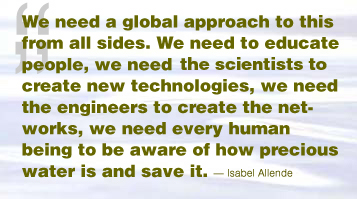

|
|


His work in the field of reverse osmosis (RO) desalination has taken him for up to a month and a half at a time to nearly every country on the Arabian Peninsula, surrounded by the Mediterranean, Red and Arabian Seas and the Persian Gulf. Desalination, which creates fresh water from salt-water sources, has truly come of age in the last decade. According to the International Desalination Association (IDA), desalination is used in more than 100 countries, with more than half the freshwater output used in the Middle East and Northern Africa. Saudi Arabia tops the list, using close to 25 percent of worldwide desalination output produced in its more than 2,000 plants. By comparison, the United States, ranked second worldwide in desalination use, produces about 16 percent of the total output. Salt of the EarthWinters, who earned his PhD from Columbia University in 1970 and did postdoctoral work in desalination there for close to 10 years, points out, “Desalination is potentially the only source of water for countries in the Middle East.” He first traveled there in 1978, when he served as a consultant to the DuPont Corporation, which manufactures membranes used in the process. He explains, “Reverse osmosis desalination allows water to travel through a synthetic membrane under high pressure, rejecting 99.9 percent of the salt in seawater and leaving you with a very good quality drinking water.” Currently, there are more reverse osmosis desalination plants in use worldwide than any other desalting technology. From 1980–1984 Winters worked in Saudi Arabia, training Saudis at the Juvail Research Center in RO on behalf of the U.S. government. And, he has consulted for the U.S. Department of Interior on desalination activities worldwide and worked under a research grant from the department. 
“In the United States, desalination is used in Florida, Texas and California because they border the oceans and the Gulf of Mexico,” he notes, adding that its cost is on par with other freshwater sources. “For example, the city of Tampa has switched to reverse osmosis desalination, and it costs about $3 for 1,000 gallons of water. That’s in line with what we pay here in New Jersey.” In the Middle East, where the governments usually subsidize the expense, the overall cost of water “is still similar to what people in Tampa are paying.” Recently, Winters worked under a grant from the Middle East Desalination Research Center (MEDRC) to determine the best way to avoid “fouling” desalination membranes with contaminants, “reducing energy consumption in the process” and enabling the maximum production of freshwater by RO desalination plants in the most cost-efficient manner. Flow of KnowledgeMEDRC links university and corporate researchers from around the world to advance the research process. Winters and Fairleigh Dickinson University partnered with Sultan Qaboos University (SQU) in Oman, the University of New South Wales in Australia and Osmonics, Inc., in the United States. As principal investigator, Winters, along with Rick Isquith, professor of biological sciences on Fairleigh Dickinson’s Metropolitan Campus and executive director for global partnerships, coordinated research conducted off the coasts of Oman, Australia and South Africa. The project included bacterial analysis, direct observation of water passing through membranes, the establishment of a pilot facility in Oman, analyses of existing commercial desalination facilities and the development of a computer program applicable to all seawater RO sites to calculate the “critical flux,” or optimal rate of flow for freshwater production. Winters’ activities stretch further. Under the MEDRC grant, he trained two researchers at SQU as well as a Palestinian researcher from Ramallah. He also serves on the board of directors of the International Desalination Association and is co-chair of its international scientific committee meeting to take place in September. Last November, he traveled to Syria on behalf of the IDA to give a desalination seminar to the government. Dialogue on TapIn another endeavor, Winters is coordinating an effort with FDU’s Institute for Global Commerce and the University of Sharjah in the United Arab Emirates to present a conference, “Innovative Developments in Desalination, Energy, Water and Security: Implications for the Middle East.” In cooperation with the International Desalination Association, the conference is scheduled to take place at the University of Sharjah in 2004. “Energy and desalination are major concerns in the Middle East,” Winters says. Because of the heat and humidity of the summer months, power plants are built to meet a high demand. “You can’t shut those energy plants down in the winter months, when demand is low, so energy is being wasted. One of the points of the conference is ‘Why throw away this energy? Why not use it to desalinate more water and store it?’” This can be and is done. Thermal desalination plants, which use heat, evaporation and condensation to collect freshwater, are often built in conjunction with power plants so the “waste” heat from the power plant runs the desalination plant. Another crucial issue to be covered is secure water storage. “There is essentially very little ground water in all these [Middle Eastern] countries, so one of the things we’ve been stressing to the people of the region is that they have very little water reserve. In addition, since the government usually subsidizes the cost of water, there is little incentive to conserve.” This leaves the area vulnerable to crisis should something happen, either naturally or as a result of conflict, as was the case in southern Iraq, “to contaminate or destroy desalination plants.” One strategy is “to go with underground ‘reservoirs’ — to store water in already existing underground pockets called aquifers, keeping it safe from pollution,” says Winters. “The same technique,” he continues, “is being used in Florida, California and even some counties in southern New Jersey; but not too many people are catching on to it. Geographical factors are very important, but if you have these aquifers, it’s very possible to do.” Another area of concern in desalination is what happens to all the salt. Environmentalists have raised concerns over the waste product, known as brine, created by the process. Brine consists of mostly water and salts, along with some chemical byproducts that are “filtered” out in the desalination process. When desalination is used inland, solutions include dilution of the brine to minimize its ecological impact before putting it back into a river, injecting it into underground aquifers, evaporating it to make rock salt and building pipelines to carry it to the sea. In the Middle East, Winters notes, “All that salt goes back into the ocean. They do consider the environmental effects, and they do a lot to try to minimize any effects on ecosystems.” Taming the TempestIf water challenges are not addressed, serious conflicts could ensue. (See “Water Wars Looming”). “There was a water dispute between Lebanon and Israel about taking water from the Jordan River,” Winters recalls. “Israel said Lebanon was taking it illegally and threatened to go to war over it.” Desalination turned out to be an important part of the solution in this case, says Winters. “Chuck Lawson, who represents the U.S. government to MEDRC, had to go there to negotiate a settlement by offering to help Israel with desalination if they let Lebanon use the river water.” “Water is a big political problem, especially with rivers that flow from one country to another,” Winters adds, using the example of the Euphrates River, once one of the strongest rivers in the Middle East. “Where it flows through Syria, it’s almost dried up. That’s because Turkey and other countries are drawing so much water before the river even gets to Syria, so Syria is potentially going without water. “Even here in the states, our rivers are disputed. Mexico sued the United States in the World Court because, they say, we were taking the water from the Colorado River for irrigation and putting it back contaminated and with a higher salinity,” Winters reports. Once again desalination was called upon to calm the storm. According to Winters, “We had to build the world’s largest reverse osmosis desalination plant in Yuma, Ariz., to desalinate the Colorado River,” just to send the freshwater downstream. The incidents illustrating the stress on the world’s water resources are countless: riots over water in Shandong, China; the degradation of the Black Sea; rampant disease throughout Africa and South and Central America due to contamination of the limited supplies of freshwater; and bans on eating fish from the Great Lakes due to polluted waters, among others. 
Chilean novelist Isabel Allende sums it up concisely in Water: The Drop of Life, by Peter Swanson and Mikhail Gorbachev, when she says, “We need a global approach to this from all sides. We need to educate people, we need the scientists to create new technologies, we need the engineers to create the networks, we need every human being to be aware of how precious water is and save it.” In Harvey Winters and his desalination research we find the global outlook, educational experience and the scientific expertise required to take on this challenge. |
|
Water Wars Looming | Raising Awareness of Water’s Worth FDU Magazine Directory | Table of Contents | FDU Home Page | Alumni Home Page | Comments |
|